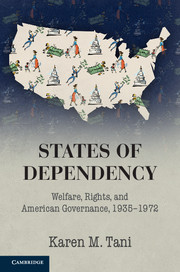Book contents
- Frontmatter
- Dedication
- Contents
- List of figures and tables
- List of gallery images
- Acknowledgments
- Introduction
- PART I 1935 TO 1949
- 1 A New Deal for Poor Relief? The Modern American State and the Endurance of the Local
- 2 Rights as an Administrative Tool: An Appeal to State and Local Bureaucrats
- 3 Rights as a “Live, Motivating Principle”: The Path toward Legalism
- 4 Claiming Welfare Rights: Fair Hearings, State-Court Claims, and a Forgotten Federal Case
- PART II 1950 TO 1972
- Conclusion
- Notes
- Selected Bibliography of Primary Sources
- Index
- Plate section
1 - A New Deal for Poor Relief? The Modern American State and the Endurance of the Local
from PART I - 1935 TO 1949
Published online by Cambridge University Press: 05 April 2016
- Frontmatter
- Dedication
- Contents
- List of figures and tables
- List of gallery images
- Acknowledgments
- Introduction
- PART I 1935 TO 1949
- 1 A New Deal for Poor Relief? The Modern American State and the Endurance of the Local
- 2 Rights as an Administrative Tool: An Appeal to State and Local Bureaucrats
- 3 Rights as a “Live, Motivating Principle”: The Path toward Legalism
- 4 Claiming Welfare Rights: Fair Hearings, State-Court Claims, and a Forgotten Federal Case
- PART II 1950 TO 1972
- Conclusion
- Notes
- Selected Bibliography of Primary Sources
- Index
- Plate section
Summary
In 1930, after Mr. Manning lost his job, his wife and children turned to public welfare. The Boston-based family likely first spent down their savings, borrowed on property, and got help from neighbors and relatives. Next they might have turned to the city's network of private and religious charities. Eventually, though – like so many others that year – the Mannings sought “dependent aid” from Boston's Overseers of the Poor. The name “dependent aid” calls to mind the mothers’ pensions movement that had swept the nation in the preceding decades (fatherless children and husbandless wives were the quintessential “dependents”). It was in fact Boston's version of “general relief.” While a state-run Mother's Aid program supported the city's most respectable poor mothers – usually widows, or women with incapacitated or absent husbands – this municipal program provided limited aid to everyone else. In the 1930s, that included thousands of families like the Mannings, felled by the unemployment of their main breadwinner.
In the spring of 1937, according to the Mannings’ case file, the family's fate changed again. Mr. Manning died and the family “was accepted” (whether they applied or were steered, the record does not say) into the Aid to Dependent Children (ADC) program. A more generous version of the Progressive Era Mother's Aid program it replaced, Massachusetts's ADC program targeted the same population and was supervised by the state, but was subsidized by federal funds and subject to federal requirements. It was part of the Roosevelt administration's broad effort to bring “security” – the watchword of the time – to a public suffering the failure of traditional lifelines.
ADC proved less secure than the Mannings would have hoped. Within months of the initial grant, as the nation's rebounding economy slid once again into a deep recession, the local worker in charge of the family's case learned from another agency “that there were serious questions about the mother's conduct.” An investigation substantiated these reports. Although “the presence of a man visitor” (perhaps a boarder, perhaps a live-in boyfriend or male relative) prevented the caseworker from getting information directly from Mrs. Manning, neighbors confirmed the troubling rumors. The caseworker then returned to the Manning home and confronted the man she found sitting on the stoop. “Who are you,” she reportedly asked, “that you should be living in Mrs. M's home?”
- Type
- Chapter
- Information
- States of DependencyWelfare, Rights, and American Governance, 1935–1972, pp. 27 - 56Publisher: Cambridge University PressPrint publication year: 2016



